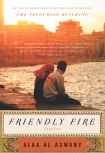Friendly Fire by Alaa Aswany (best books to read for students .TXT) 📕

Read free book «Friendly Fire by Alaa Aswany (best books to read for students .TXT) 📕» - read online or download for free at americanlibrarybooks.com
- Author: Alaa Aswany
Read book online «Friendly Fire by Alaa Aswany (best books to read for students .TXT) 📕». Author - Alaa Aswany
So there we would sit, all together in the parlor. My father and Tante Zitta would be trying to hold an intense conversation and Antoine would be his usual aloof self, but I’d be giving it all I had: I’d flirt with Tante Zitta and surrender to her kisses, her strong, titillating perfume, and the feel of her warm, smooth skin. I’d tell her about my school and make up fabulous heroic deeds that I’d performed with my fellow students and she’d pretend that she believed me and make a show of astonishment and fear that I might get hurt in the course of one of these amazing ‘feats.’
I was very fond of Tante Zitta and colluded totally with my father when each time on the way back he’d impress on me that I shouldn’t tell my mother. I’d nod my head like a real man who could be relied on and when my mother, with her apprehensive, reluctant, alarming eyes, would ask me, I’d say, “Father and I went to the cinema,” lying without either fear or the slightest sense of guilt or betrayal.
Zitta’s magic world captivated me. I keep it in my heart. Even her apartment I can summon up in detail now as a model of ancient European elegance—the large mirror in the entrance and the curly wooden stand on which we would hang our coats, the round polished brass pots decorated with a lion’s head on either side for the plants, the heavy, drawn drapes through which the subdued daylight filtered, the light-colored patterned wallpaper and set of dark brown armchairs with olive-green slip covers, and, in the corner, the large black piano (Zitta worked as a dancer at a nightclub on Elfi Street, which is where, I suppose, my father must have met her).
Tante Zitta would go into the kitchen to get the food ready and my father would draw Antoine and me close and put his hands on us and talk to us like an affectionate father chatting with his sons during a moment of rest. From time to time he would shout out in mock complaint about how long the food was taking and Zitta would answer laughingly from the kitchen. (I now take these touches of domesticity as evidence that my father was thinking of marrying her).
The luncheon table was a work of art—the shining white table cloth, the napkins ironed and folded with offhand elegance, the polished white plates with the knives, forks, and spoons laid round them in the same order. There would be a vase of roses, a jug of water, sparkling glasses, and a tall bottle lying on its side in a metal vessel filled with ice cubes. Tante Zitta’s food was delicious and resembled that at the luxurious restaurants to which my father would occasionally take my mother and me. I would eat carefully and pretend to be full quickly, the way they’d taught me at home, so that no one might criticize me, but my father and Tante Zitta would be oblivious to everything, sitting next to one another, eating, drinking, whispering, and constantly laughing. Then my father would urge her to sing. At first she would refuse. Then she’d give in and sit down at the piano. Gradually the smile would disappear and her face would take on a serious expression as she ran her fingers over the keys and scattered, halting tunes rose from the keyboard. At a certain point, Zitta would bow her head and close her eyes as though trying to capture a particular idea. Then she would start to play. She would sing the songs of Edith Piaf—Non, je ne regrette rien and La vie en rose.
She had a melodious voice with a melancholy huskiness to it and when she got to the end she would remain for a few moments with her head bowed and her eyes closed, pressing on the keys with her fingers. I would clap enthusiastically and Antoine would remain silent, but my father’s excitement would know no bounds. By this time he would have taken off his jacket and loosened his tie, and he would clap and shout, “Bravo!”, hurrying to her side and planting a kiss on her forehead, or taking her hands in his and kissing them. Experience had taught us that this was a signal for me and Antoine to leave. Antoine would get up first, saying as he moved toward the door of the apartment, “Mama, we’ll go outside and play.” I can see now—with understanding and a smile—the face of my father, flushed with drink, alight with desire, as he searched impatiently through his pockets, then presented me and Antoine with two whole pounds, saying, as he waved us toward the door, “Tell you what. How about some ice-cream at New Kursaal after you’ve finished playing?”
1996
The foreigners’ table at Groppi’s. All of them are old—Armenians and Greeks who have spent their lives in Egypt and kept going until they are completely alone. Their weekly date is at seven on Sunday mornings, and when they cross empty Talaat Harb Street, walking with slow, feeble steps, either propping one another up or supporting themselves on their walking sticks, they look as though they had just arisen from the dead, brushed off the grave dust, and come.
In Groppi’s they sit at one table, which never





Comments (0)